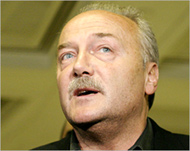US report: Iraq rewarded Russians
Russian leaders received millions of dollars in Iraqi oil allocations from top representatives in Saddam Hussein’s former government in the hope of ending UN penalties against Iraq, Senate investigators have been told.

Saddam’s vice president, Taha Yasin Ramadan, told investigators that the allocations were “compensation for support”, according to a report released on Monday by the Senate Homeland Security and Governmental Affairs investigations subcommittee.
Russia’s Foreign Ministry declined to comment on the report.
It said it would be “unethical to make any statements” until a UN-appointed commission investigating the oil-for-food programme releases its third and probably final report this summer.
The Senate investigators said their interviews and documents from the former Iraqi government add to evidence in previous probes linking Russian officials to abuses in the $64 billion UN programme.
It was designed to permit Saddam to sell some oil and use the proceeds to buy food, medicine and other humanitarian items.
Oil vouchers
Among the officials implicated are Alexander Voloshin, former chief of staff to President Vladimir Putin, and ultranationalist Russian lawmaker Vladimir Zhirinovsky, who denied any wrongdoing.
He told Ekho Moskvy radio that he never received money from Iraq or from companies that bought oil from Saddam Hussein’s government.
|
“I have never been to Iraq, I have never met Saddam Hussein. I have never received anything from the Iraqis, in Charles Pasqua, |
Mikhail Troyansky, deputy chief of Foreign Ministry’s information department, said Russia has cooperated with the UN commission’s investigation, which is led by former Federal Reserve chairman Paul Volcker.
The release of the Senate panel’s findings precedes a hearing on Tuesday on Saddam’s alleged use of oil vouchers to reward supporters. The vouchers are said to have allowed the bearer to buy Iraqi oil at cut-rate prices and could be sold for a profit.
Saddam also demanded kickbacks from the oil transactions, it is alleged.
“This is the way Saddam used oil-for-food to line his own pocket and to curry political favour,” subcommittee chairman Norm Coleman said.
Denials
Documents released by the panel last week claimed former French interior minister Charles Pasqua and British politician George Galloway also accepted allocations, charges both men deny.
Galloway has said he will appear at Tuesday’s hearing to defend himself. He was flying to Washington on Monday.
 |
|
George Galloway will face a |
In Paris, Pasqua said he was caught up in the crossfire of what he described as an American campaign against France.
“I have never been to Iraq, I have never met Saddam Hussein. I have never received anything from the Iraqis, in any domain,” he said at a news conference.
He said he is ready “when the time comes” to talk to the US Senate committee.
Coleman said he has not reached any conclusion about whether UN Secretary-General Kofi Annan should have been aware of the abuses of vouchers, but the senator renewed his call for Annan to resign.
“It’s a matter of accountability,” he said.
The latest report by the subcommittee deals with allocations given to Zhirinovsky, Voloshin and Sergey Issakov, an aide to Voloshin.
Iraqi officials
Investigators said they interviewed 16 former Iraqi officials, but they identified only Ramadan and Tariq Aziz, the former deputy prime minister.
The report said the Russian Presidential Council, led by Voloshin, received allocations worth more than $16 million, according to Iraq’s oil ministry.
The subcommittee said Zhirinovsky got allocations worth $8.7 million. On six occasions, investigators said, he sold allotments to the Texas oil company Bayoil, whose owner, David B. Chalmers, has been indicted on charges related to the oil-for-food scandal.
The panel’s report said about 30% of the oil sold in the oil-for-food programme was allocated to Russia, even though Russia is an oil-exporting country.